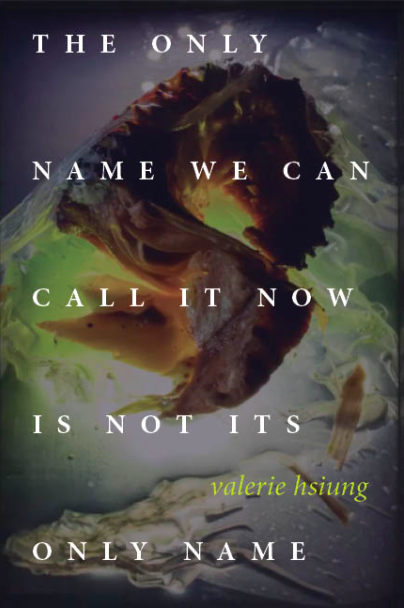Books
The only name we can call it now is not its only name (Counterpath, 2023)
The only name we can call it now is not its only name

The only name we can call it now is not its only name is a book of hybrid poetry by artist Valerie Hsiung.
Date: March 2023
Publisher: Counterpath
Format: Print
Genre: Poetry, Prose, Performance
Order from Asterism, Bookshop, McNally Jackson, Brazos Books & Counterpath
Interview in BOMB Magazine
Review in The Poetry Project Newsletter
Review in Cleveland Review of Books
Review in Tupelo Quarterly
Excerpt in Annulet
Excerpt in BathHouse Journal
Excerpt in Black Sun Lit
Praise
“This book descends like a feral cloud from the abyss, able to change the weather of its reader through a hypnotic, swaying performance. A multidimensional braid of gestural vibrancy and "autobiographical transnational history" threads this temporally fluctuating lyric graveyard of intimate energies. Hsiung reminds readers to "slow down the vessel" to consider the ways in which the poet ionizes meaning, memory, and language itself, blurring the "frames within each frame" into new organisms rising and singing from the worm-rich mulch of The only name we can call it now is not its only name."
- Angel Dominguez
“The only name we call it now is not its only name moves immediately beyond the realm of the bound book into an aeriel and psychedelic projection of mind, a continuously unfolding pattern that we can only ascertain from above the earth and through the concurrent music of clashing fragments. Hsiung’s text maintains its velocity and charm through perfectly timed peripheral detail giving way to the crystallized ongoing, luminous present. I never wanted to leave this book as it so closely illustrates the way a poet thinks back on reality: posing words as free-floating enclosures, sound being used as a necessary weapon of defense and our experience of being surrounded by language, helpless to continue listening and binding and throwing the line back out in new, unquantifiable formations.”
- Cedar Sigo
“This book descends like a feral cloud from the abyss, able to change the weather of its reader through a hypnotic, swaying performance. A multidimensional braid of gestural vibrancy and "autobiographical transnational history" threads this temporally fluctuating lyric graveyard of intimate energies. Hsiung reminds readers to "slow down the vessel" to consider the ways in which the poet ionizes meaning, memory, and language itself, blurring the "frames within each frame" into new organisms rising and singing from the worm-rich mulch of The only name we can call it now is not its only name."
- Angel Dominguez
“The only name we call it now is not its only name moves immediately beyond the realm of the bound book into an aeriel and psychedelic projection of mind, a continuously unfolding pattern that we can only ascertain from above the earth and through the concurrent music of clashing fragments. Hsiung’s text maintains its velocity and charm through perfectly timed peripheral detail giving way to the crystallized ongoing, luminous present. I never wanted to leave this book as it so closely illustrates the way a poet thinks back on reality: posing words as free-floating enclosures, sound being used as a necessary weapon of defense and our experience of being surrounded by language, helpless to continue listening and binding and throwing the line back out in new, unquantifiable formations.”
- Cedar Sigo
“Valerie Hsiung’s The only name we can call it now is not its only name takes us through the territory/lessness of the exiled: what is done to location, how one locates the self and community, and the journey to arrival should there be one. The tongue of the exiled contains multitude voices and forms. Hsiung’s poems speak to me about the performance of arriving at language reached through translations, through arrangements of letters that is also a displacement of other letters, territories, and bodies. The twists and detours in the story of “a place where I could not speak at first. I had to learn,” speaks also to the journey to language the autobiography of community. What we think of as voice is not free of the politics of dispossession. In this landscape, the only certainty is that of impermanence and of change. The poems resist the meanings we might ascribe to it, slip into forms when we think we know its name. It’s a stunning collection.“
- Tsering Wangmo Dhompa
“Mise en scène: Valerie Hsiung’s virtuosic, book-length psychedelia-against-empire—a poetics of obfuscation measured out among heteronyms, a devastating excavation of memory as linguistic matter, performatively picking the scab of phonic displacements, fleetingly renderable while impossible to untangle. [...] Taken as an ongoing whole, the rigorous arc of Hsiung’s work feels immediately improvised & obscure. Prose gives way to crisp lineation, pulsing with charm & tragedy in a tenor all her own. Hsiung possesses a thoroughness of vision & technique, as reckless as it is dazzlingly realized in a space between poetics-as-such & performance art. [...] With The Only Name, the reader encounters something close to the total risk of being. Through the conduit of historical materialism—upheavals of displacement reorienting a person or people’s total experience of grounding—mother tongues & discrete customs of the body must epistemologically contort. Regardless of whether the artist would pose her stakes as such, the book deals in bitter roots (an empire’s obliterative wake), chronicled in their own particular languages.“
-imogen xtian smith, The Poetry Project Newsletter